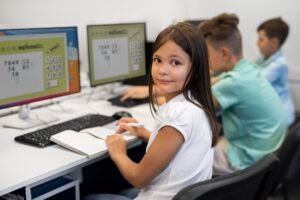
Special education is a tailored and comprehensive educational approach designed to meet the unique needs of students with diverse learning abilities and disabilities. It encompasses a range of instructional strategies, support services, and educational interventions that aim to address the individual challenges faced by students who may have developmental, cognitive, emotional, or physical impairments. The goal of special education is to provide an inclusive and equitable learning environment where every student can achieve academic success and personal growth. This specialized form of education involves the collaboration of educators, specialists, and parents to create personalized education plans, accommodate diverse learning styles, and implement assistive technologies.
By fostering an inclusive and supportive atmosphere, special education aims to empower students with the tools and skills necessary to overcome obstacles and reach their full potential, promoting a more inclusive society that values diversity and embraces the principle that every individual deserves an opportunity to learn and thrive.
Benifit of Special education
 The benefits of special education are manifold, contributing significantly to the overall educational landscape by fostering inclusivity, addressing diverse learning needs, and promoting individualized growth. One primary advantage is the provision of tailored instruction, enabling educators to customize teaching methods to suit the unique strengths and challenges of each student. Special education also emphasizes early intervention, identifying and addressing learning difficulties promptly, thereby preventing academic gaps from widening. Furthermore, the collaborative nature of special education involves close coordination between teachers, specialists, and parents, creating a supportive network that enhances the overall educational experience for students with diverse abilities.
The benefits of special education are manifold, contributing significantly to the overall educational landscape by fostering inclusivity, addressing diverse learning needs, and promoting individualized growth. One primary advantage is the provision of tailored instruction, enabling educators to customize teaching methods to suit the unique strengths and challenges of each student. Special education also emphasizes early intervention, identifying and addressing learning difficulties promptly, thereby preventing academic gaps from widening. Furthermore, the collaborative nature of special education involves close coordination between teachers, specialists, and parents, creating a supportive network that enhances the overall educational experience for students with diverse abilities.
Special education F&Q's
The primary goal of special education is to provide customized educational support and interventions to meet the unique needs of students with disabilities, ensuring they have equal access to education and opportunities for personal development.
IEPs are crucial in special education as they outline personalized goals, services, and accommodations for each student with a disability. These plans are collaboratively developed by educators, parents, and specialists to address specific learning objectives and support the student’s overall growth.
Special education teachers play a pivotal role in the inclusive education system by tailoring their teaching methods to accommodate diverse learning styles, providing additional support to students with disabilities, and collaborating with general education teachers to create an inclusive and supportive learning environment.
Early intervention is critical in special education as it allows for the timely identification and addressing of learning challenges, preventing potential academic gaps and setting the foundation for a student’s educational success by providing targeted support during their formative years.
Parental involvement is crucial in special education as it fosters a collaborative partnership between educators and families. Parents actively participate in the development of IEPs, contribute valuable insights about their child’s needs, and play a vital role in supporting their child’s learning and development at home.
Special education contributes to building a more inclusive society by promoting diversity, understanding, and acceptance. It empowers individuals with disabilities to become active participants in their communities, challenging stereotypes, and fostering a culture that values the unique contributions of every individual, regardless of their abilities.
